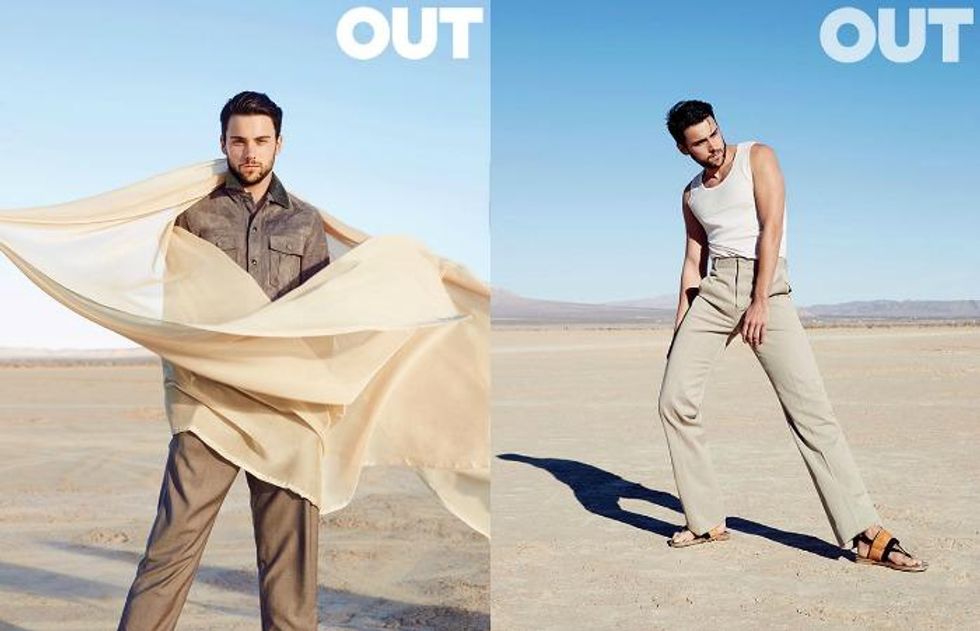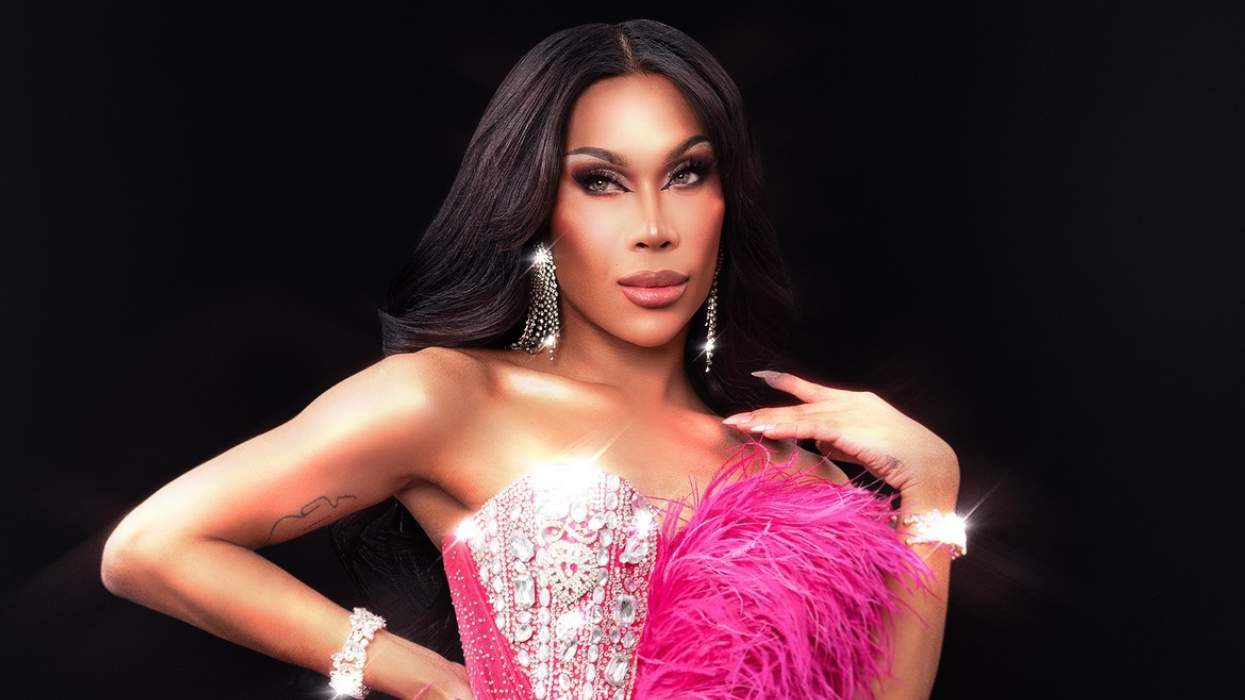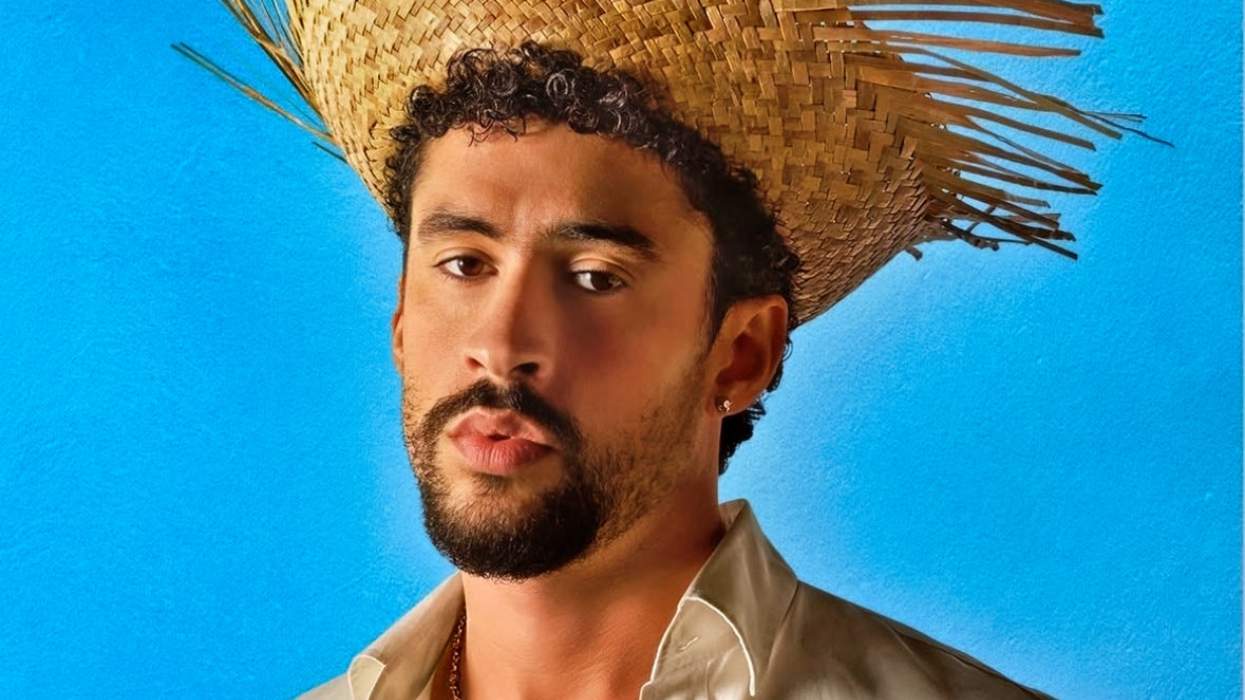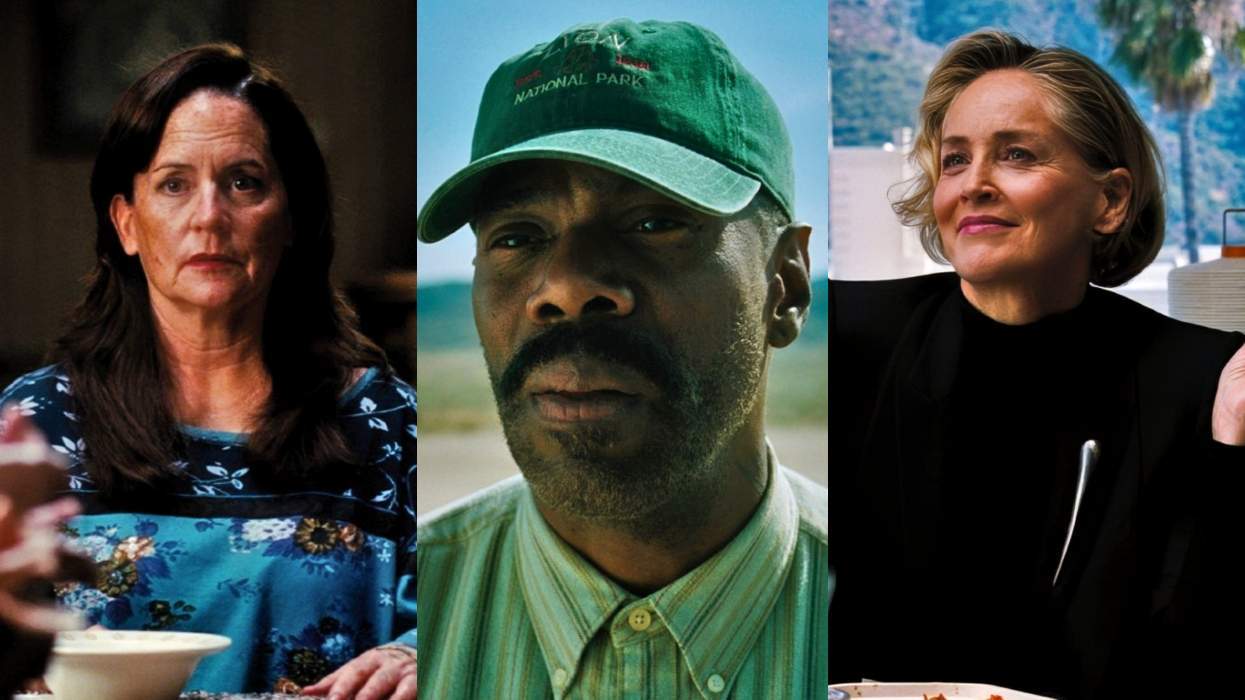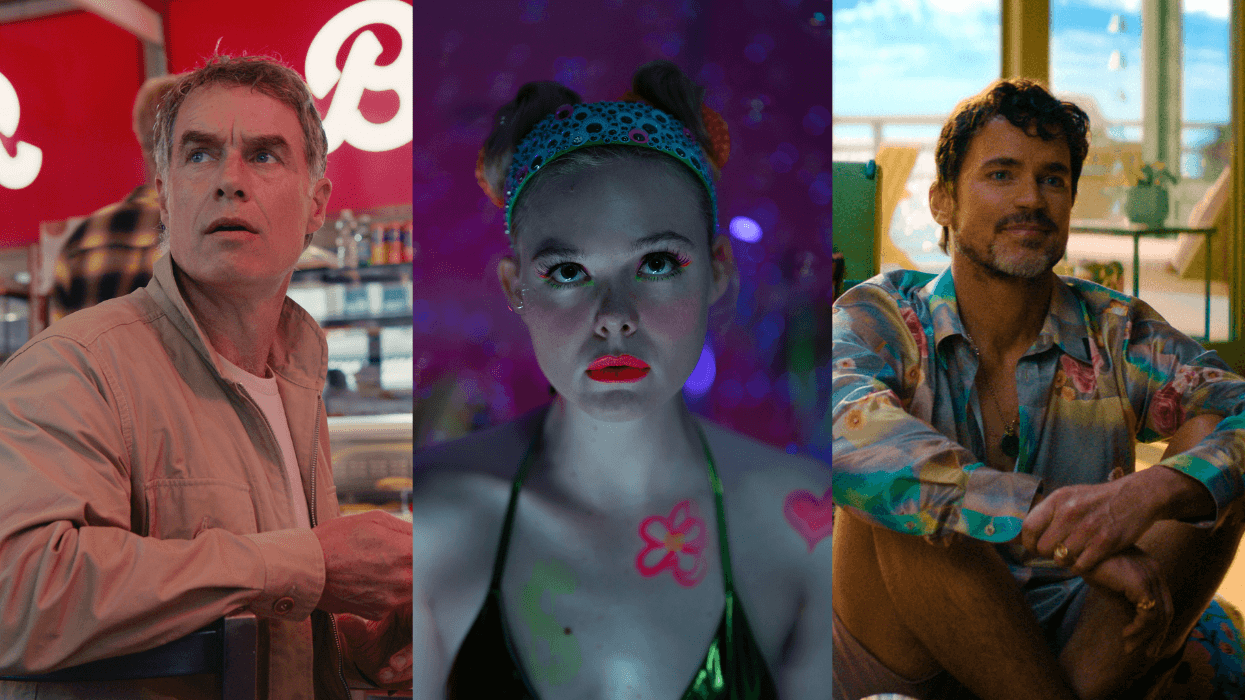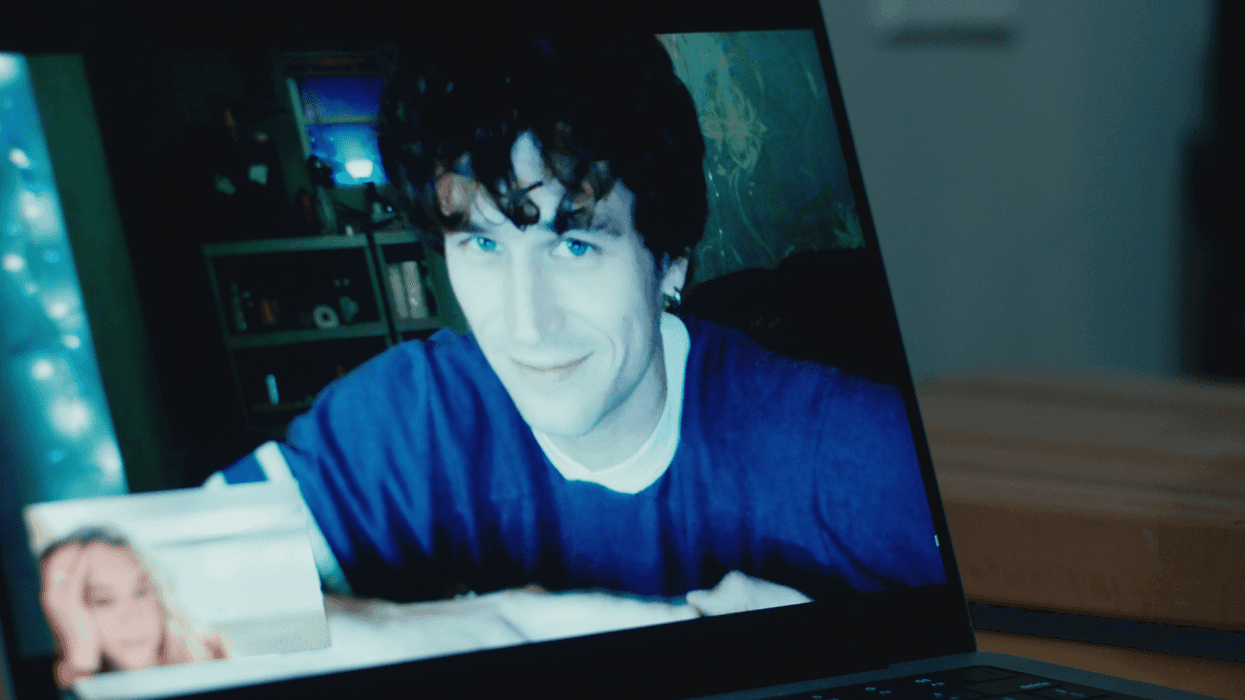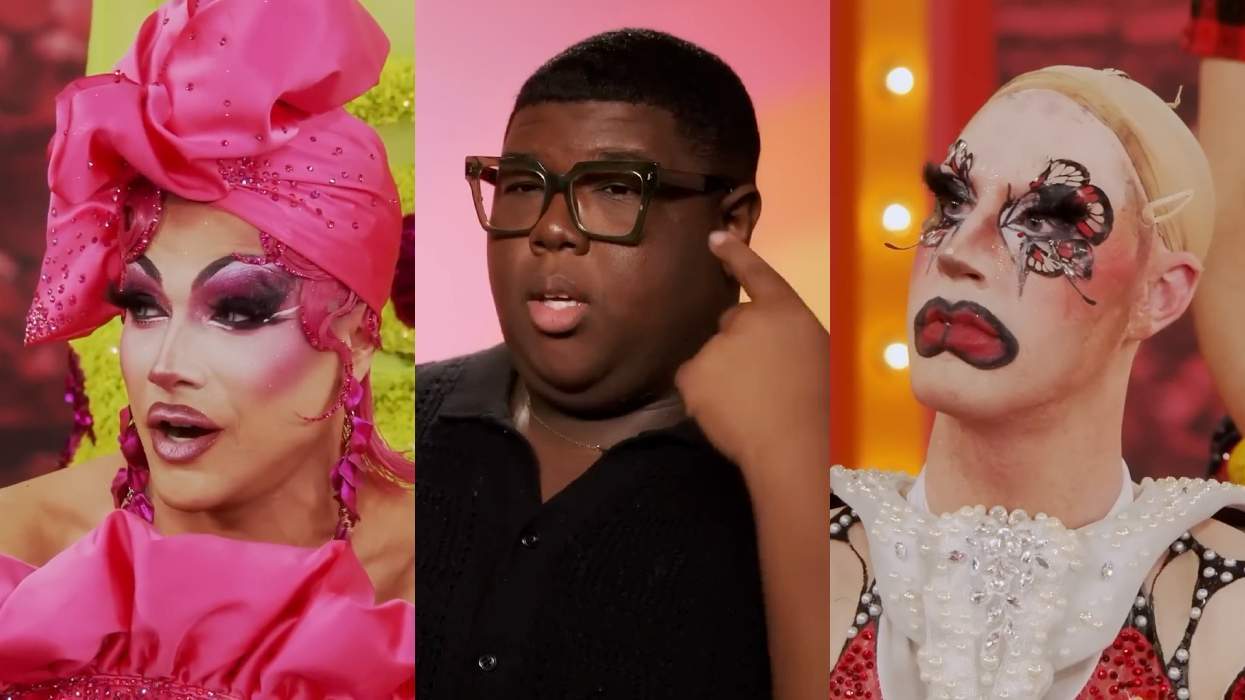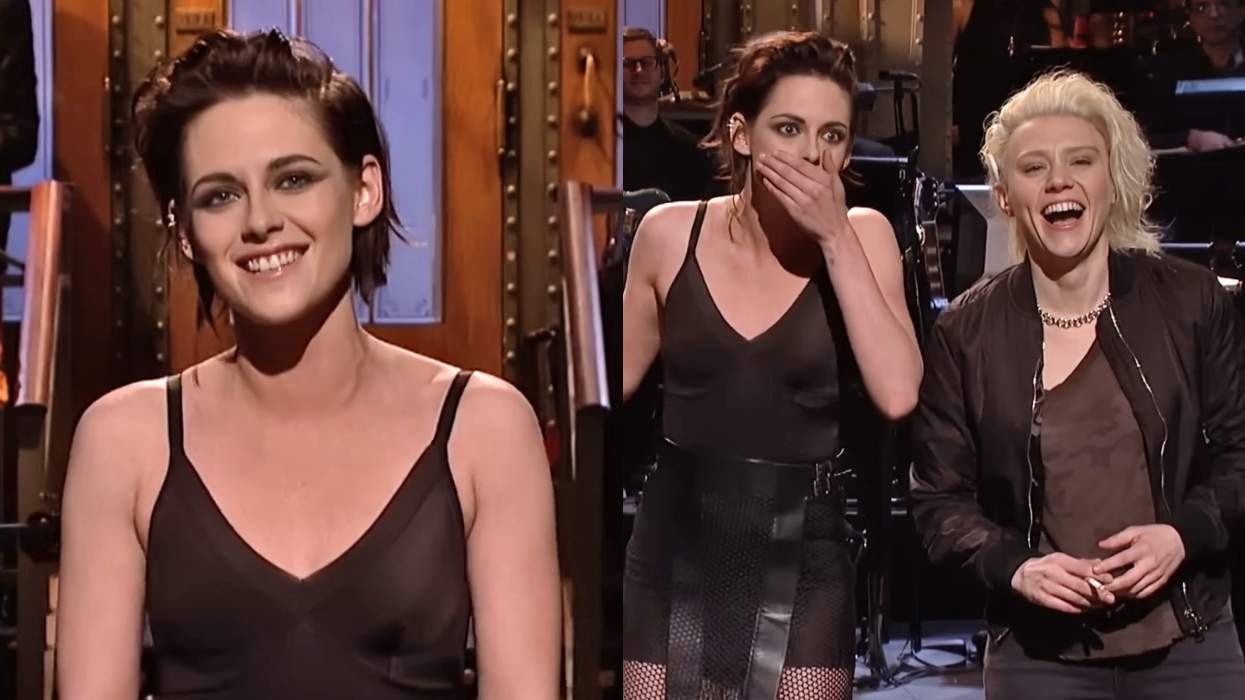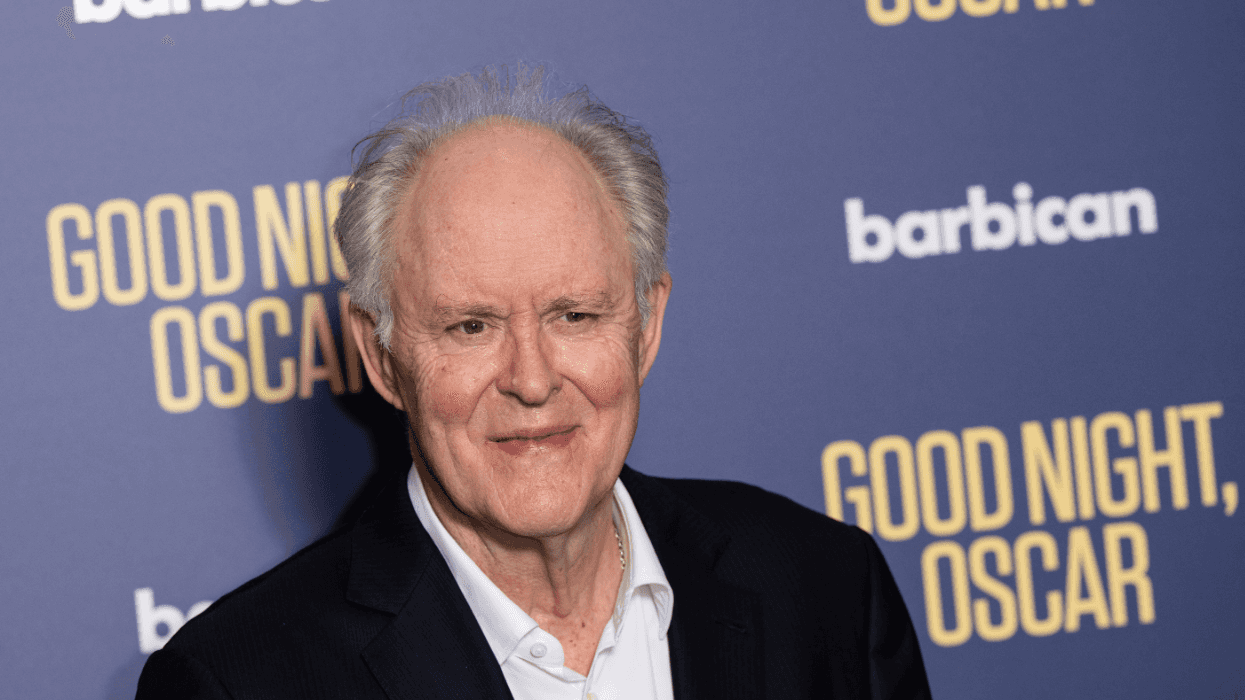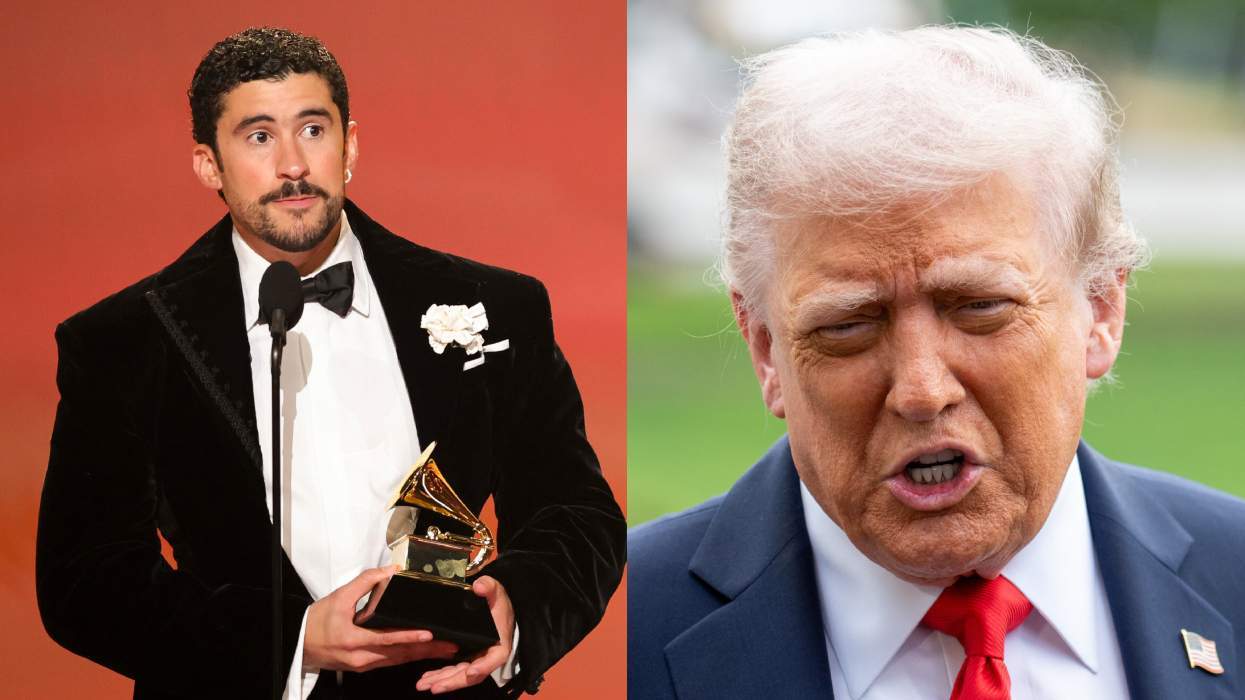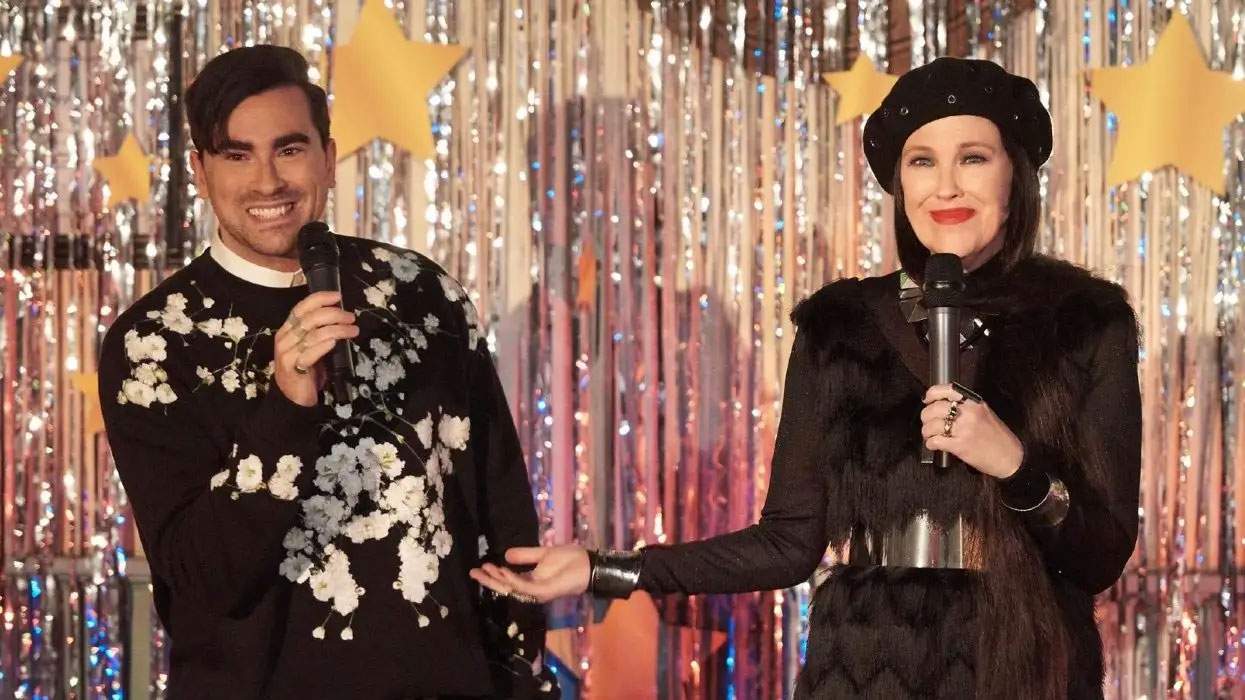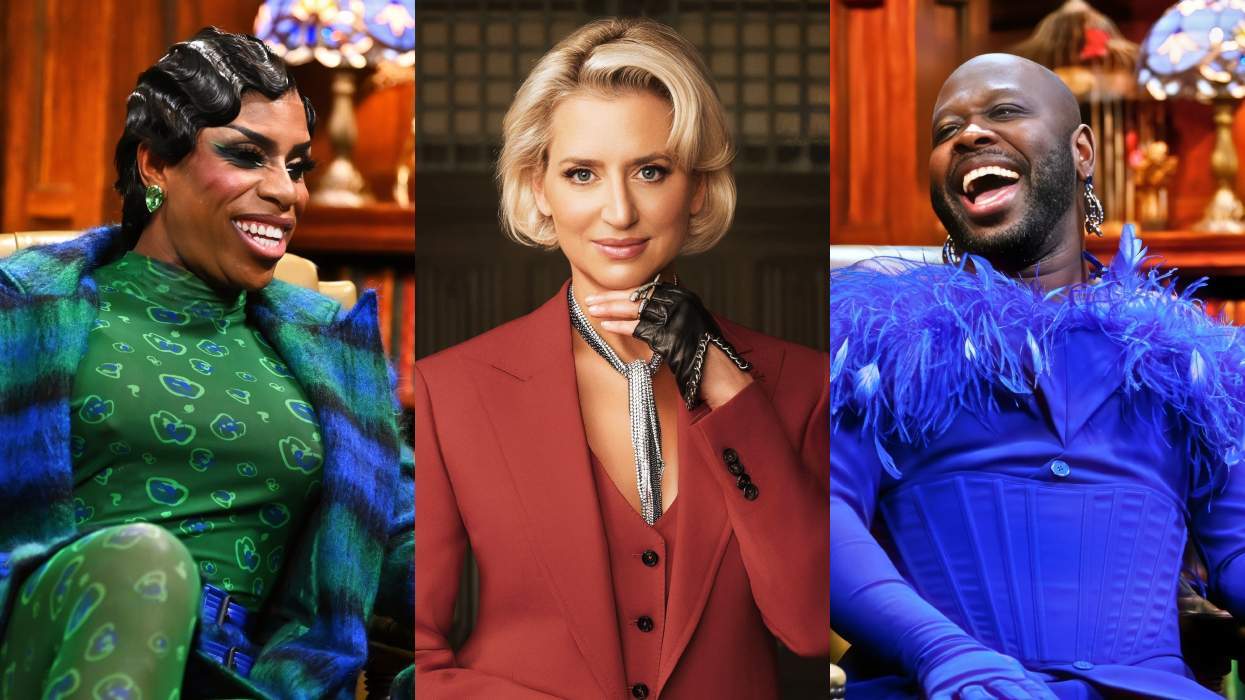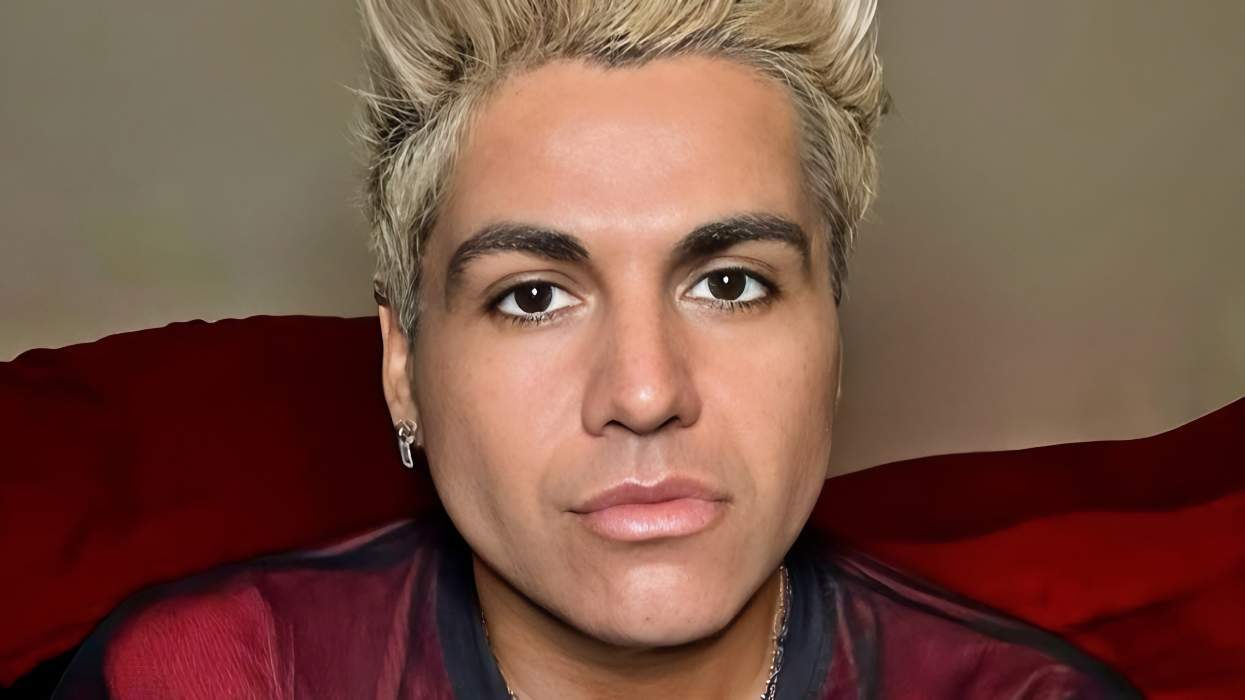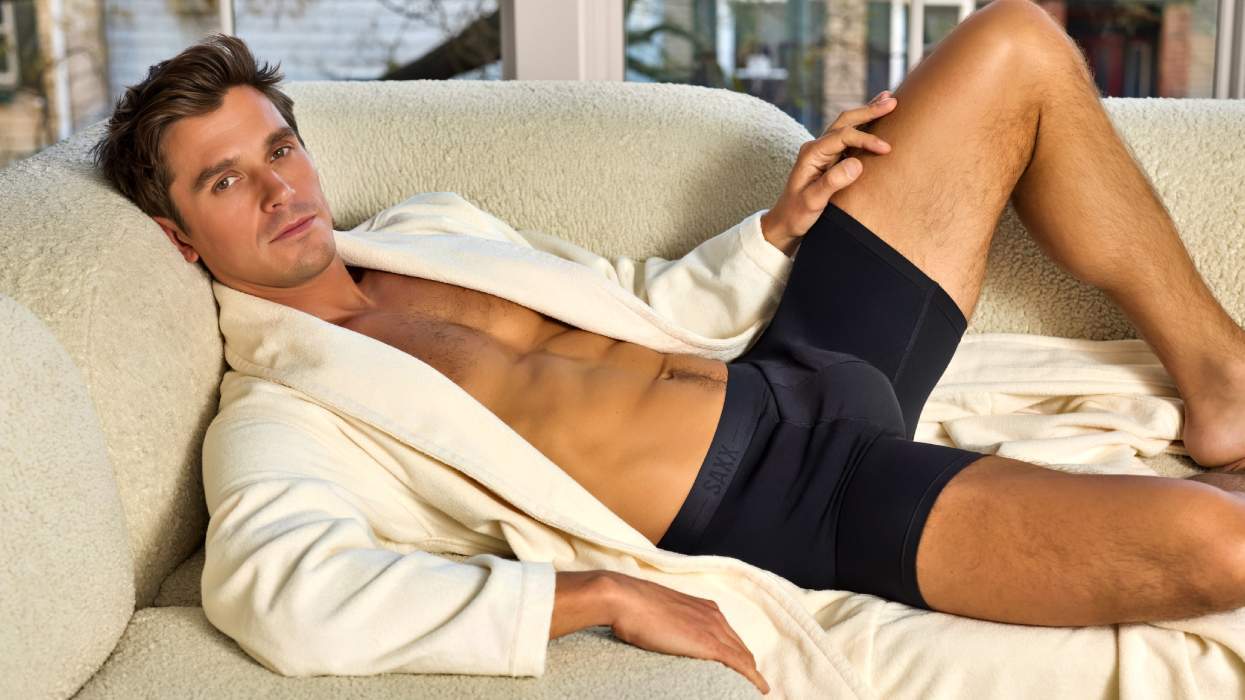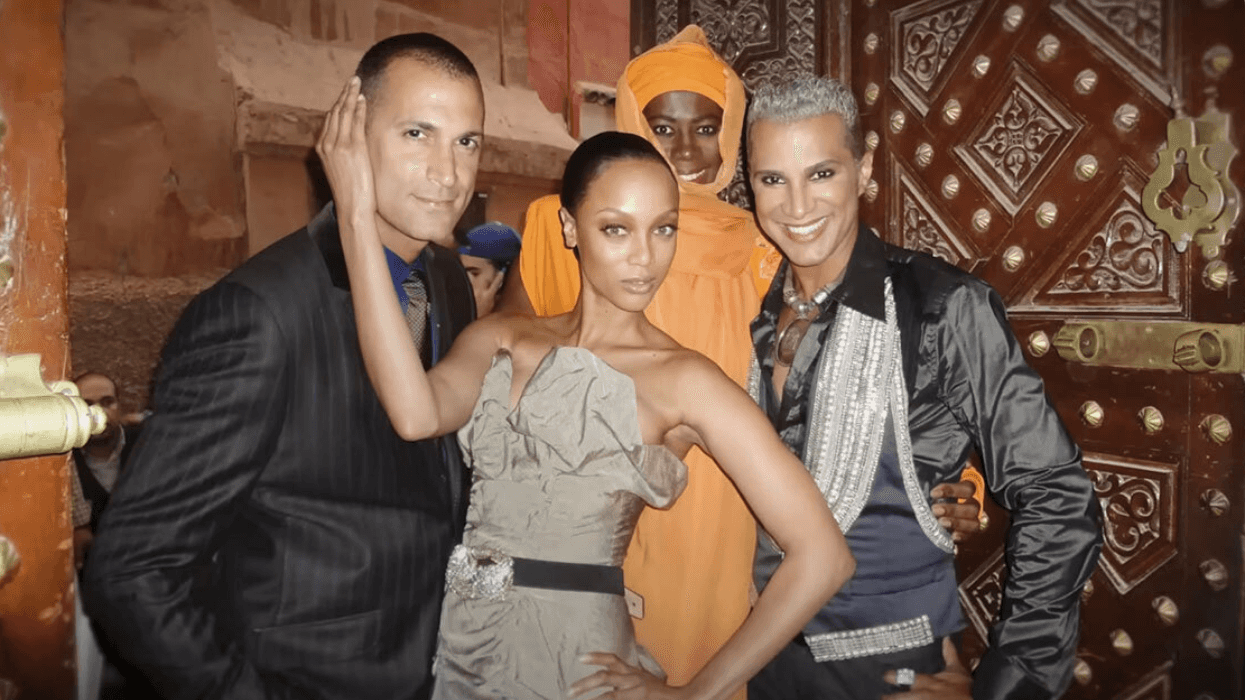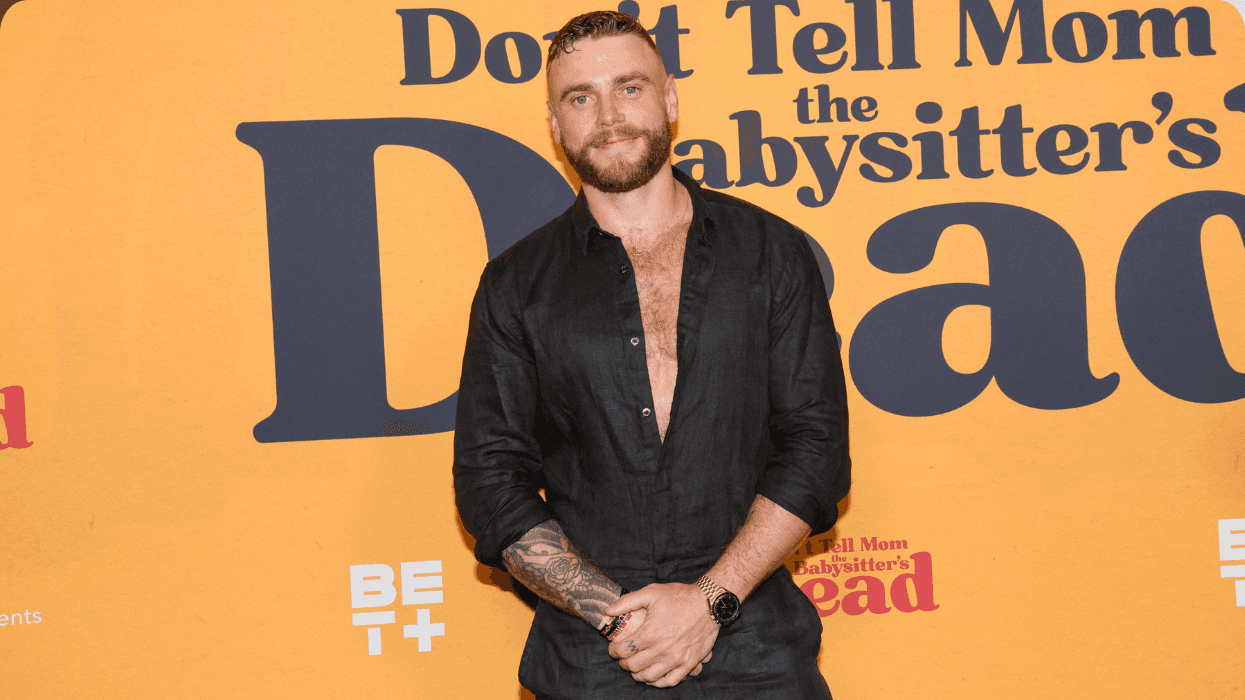Photography by Thomas Giddings | Groomer: Ananda Tuyes
It all started with ass licking.
"I sort of jumped head first into it," Jack Falahee says, "or was thrown, I should say."
On the buzzy new show from TV's most powerful producer, Falahee was "the gay one." Two of the ensemble cast's young law students were played by white guys, and he was the one you didn't recognize from Orange Is the New Black (the other actor was Matt McGorry).
That's no knock on his acting -- from his first scene, Falahee's feral charisma is captivating and chilling in equal measure -- but initially it seemed like How to Get Away With Murder was simply following Shonda Rhimes's standard, though admittedly groundbreaking, diversity script. And, anyway, who could see past Viola Davis's powerhouse performance as the professor-mastermind, Annalise Keating?
And then.
In the debut episode, Falahee's character, Connor Walsh, charms Oliver, an IT guy whose hacking expertise Connor needs to help Keating win her case. But Connor doesn't stop once he's got the intel in hand.
"Turn over," he tells Oliver, and then runs his mouth all the way down Oliver's spine.
Hit rewind. Reload that GIF. Send that spazzy tweet, making sure everyone else saw it. That's what even the most jaded gay viewer I know did.
Sixteen years ago, the original, British Queer as Folk ruffled a few feathers when its premiere on publicly owned Channel 4 featured an even more explicit rimming scene (the devirginization of an underage teen played by Charlie Hunnam, no less). It was soon repeated on Showtime's version. But on American network TV, in prime time? No one had gone there. Three episodes later, in case you had missed the headlines, they did it again. The object of Connor's seduction that week was a cute executive assistant, ravaged on the floor of a copy room. A recording device planted on the dazed assistant captured the tryst recap he later offered to an accomplice: "And he did this thing to my ass that made my eyes water."
One unamused viewer unleashed a firestorm, by tweeting at Rhimes that the show's "gay scenes" were "too much." Rhimes -- who has more than 800,000 followers -- replied forcefully, "There are no GAY scenes. There are scenes with people in them." For clarification, she added: "If u use the phrase 'gay scenes,' u are not only LATE to the party but also NOT INVITED to the party. Bye Felicia."
"Maybe I'm naive," Falahee says, "but I was actually a little surprised."
Falahee doesn't own a TV, still borrows his parents' HBO Go password, and uses his brother's Netflix account to watch cable shows, which might explain some of his bewilderment at becoming the new poster boy for on-screen gay sex in mainstream media. "I'm glad that it is a big deal -- it's a huge deal -- but you don't think about that when you go to work. On Monday, I have to go and do a bunch of scenes, and I'm thinking about my actions and my goals and objectives -- not I'm going to go make a difference."
The series' easy, explicit, and egalitarian writing shouldn't come as much of a surprise -- while Rhimes's Shondaland production company is behind Murder, its creator and showrunner, Peter Nowalk, is himself gay. "I'm hoping it feels messy in the way that life is messy," Nowalk says. "The fact that we've had some gay sex on the show has gotten more attention than any of us expected. For me it's just equal opportunity."
As Connor, Falahee lopes around his targets, a cocky overachiever in academics and especially in bed. He simultaneously sexts six guys until one coughs up key evidence, and blithely threatens to break up a classmate's engagement by bragging he banged her fiance in
boarding school.
"He had to be many things at once," Nowalk says of casting Connor. "Sly, sexy, very smart. He had to deliver some lines that could come across as really hateful or mean, so I needed someone who could do that with a real sense of charm underneath all the angst and cruelty. The thing that Jack did so brilliantly was not try to be sexy. He has that confidence to just be able to flirt without even trying."
That effortless allure -- "Jack has good chemistry with everyone on the show," Nowalk says -- also helped transform what was originally intended as a mere hookup into a real romance between Connor and Oliver (played by gay actor Conrad Ricamora), one that's put in danger when the students take all that classroom advice and cover up the death of their professor's husband. "Sex is very important to Connor," Nowalk says, "but Jack was also adding this layer of vulnerability that allowed us to take Connor to a darker place."
Within a few months of being on the air, Murder's sexy, time-jumping whodunit drama had become undeniably addictive; the show was widely heralded as 2014's biggest hit debut. Fans passionately rooted for #Coliver. And Falahee's name and smirking mug were suddenly on all of the breakout-star-of-the-year lists.
"There are stakes now. I'm finally, eight or nine months after having shot the pilot, sort of getting used to the idea," Falahee says on a bright, crisp Los Angeles day in January. "I'm innately more critical, because I know some 10 million people are watching my work every Thursday."
Overnight success, even for a brand-new It boy, is mostly a myth. "This time last year, I was getting my game face on," he says of his first frenetic effort at pilot season, the short annual rush in which actors vie to be cast in new shows that may not even make it on air. "I'd moved out here six months before to do the rounds and meet everyone with the hope that I'd stand a fighting chance. I've spent hundreds of hours auditioning."
The second youngest of four kids, Falahee, 26, grew up in Ann Arbor, Mich. -- "a liberal town with educated and liberal parents, surrounded by a red-state mentality." He studied drama at New York University and then started to pick up indie film work and a few TV appearances. "Moving to L.A. in general has been really healthy and positive for me, as opposed to my life in New York. But being thrown into the Hollywood scene has been difficult and hard to navigate, and any opportunity for me to keep my feet on the ground, reflect a little bit, and disconnect is beneficial."
So he's resolved to be better at journaling -- writing by hand, using a heavy navy Moleskine that sits on the table at the L.A. restaurant where we talk, along with a copy of Betty Friedan's The Feminine Mystique ("I'm only like a hundred pages in," he says). He describes his journal as "a mess" of stream-of-consciousness rambling. "God forbid anyone ever reads it," he says, before admitting he left last year's edition out during a recent party at his house with 50 or 60 people in attendance. "Nothing too crazy in there," he says, a tad hopefully.
Like the overachieving Connor, Falahee is a perfectionist. "I'm very rarely pleased with my work," he admits, adding that his big goal for 2015 is to be more forgiving of himself. "For an actor there's no standard, right? You can't get high marks. But it's also, I think, informative to watch myself on screen, so I try to do it."
His mom gave him classically Midwestern advice for staying grounded -- keep his old friends close -- and among a chummy cast gleefully sharing their shenanigans on social media, his new friendship with Murder's McGorry (who also plays John Bennett, the baby-daddy guard on OITNB) has developed into a pigtail-pulling, bosom buddy-esque bond.
Asking McGorry about Falahee is like playing the game two truths and a lie. ("Imagine what it's like working with him," Falahee quips.) "He has a love for animation," McGorry offers, before adding, deadpan: "He actually only uses anime porn."
McGorry, who was a personal trainer for 10 years, tells me the two worked out together while shooting the pilot in Philadelphia, and that he shared some bench press techniques.
"Bench press, that's hilarious," Falahee says flatly. (It is not at all clear why or whether he really finds this hilarious.) "I'll let him have it. No, look, he's a great trainer. He's definitely given me advice before, but -- " Here he does his best McGorry voice: " 'Yeah, I give him bench press tips' -- yeah, all right, bro. Whatever."
"He said you have resting bitch face," I add.
"Wow," Falahee replies, poker-faced. "That's the nicest thing he's ever said about me." Then he cackles.
It's no longer enough to just play gay, accept some community awards, and fumble your way through an interview, hoping you don't accidentally use the wrong word and piss people off. "Jack's more well-read on gay issues than I am, for sure," Nowalk says. "He's really taken the mantle of responsibility."
In addition to second-wave feminist classics, Falahee is slowly working his way through Michel Foucault's weighty The History of Sexuality -- "very dense but very interesting," he says -- as well as the anthology Against Equality: Queer Critiques of Gay Marriage and the late Leslie Feinberg's Trans Liberation: Beyond Pink or Blue. "I've been digesting a bit of material," he says. A recent appearance (with McGorry) at the Trevor Project's semi-annual gala allowed him to chime in on an issue that was already "near and dear" to him.
"I've lost friends to suicide, a few of whom were closeted and didn't have anywhere to turn. It pains my heart. Look at this young woman Leelah Alcorn," he says, referring to the Ohio transgender teen whose Tumblr suicide note went viral earlier this year. "She didn't think she could be who she wanted to be -- who she was -- and it's fucking awful. Now that I'm in a position where people are curious about what I have to say about things, I would like to help."
What he really doesn't want to talk about is his own sexual orientation, even if it's on everyone else's minds.
"I don't think answering who I'm sleeping with accomplishes anything other than quenching the thirst of curiosity," he says. "And moreover, it seems reductive. It's been really interesting to be in the middle of the industry's fascination with the individual, because I never thought about that growing up or when I was at acting school. No matter how I answer, someone will say, 'No, that's not true.'"
I'm the first journalist to straight-out ask, he says, "but everyone wants to." We spend a good 10 minutes debating why it might matter to any of us how he answers, or why he won't. "We still live in this hetero-normative, patriarchal society that is intent on placing everything within these binaries," he says. "I really hope that -- if not in my lifetime, my children's lifetime -- this won't be a question, that we won't need this."
Falahee's friend Dan Sickles recently directed Mala Mala, a documentary about the trans community in Puerto Rico, and when he traveled with one of the film's subjects to a Ukrainian film festival, the venue was burned down, presumably by homophobic thugs. The filmmaker followed his star, April Carrion, onto the stage of a theater that defiantly hosted a screening despite the risk of another violent attack.
"This is all part of a greater, grander picture," Falahee says, "and how I define my sexuality seems so trivial compared to my friend living through the fear of getting onstage and presenting his film."
He makes a decent case that would make Professor Keating proud -- I believe he's sincere, if short-sighted -- and gamely sticks to his guns, if growing a little hot under the collar, tugging at the neck of his shirt and running his hands through his hair.
"I am not Connor, and Connor is not me," he says. "I understand that people want to feel some sort of connection with me, but I would encourage them to feel that through the work."
That might be overestimating most viewers' interest in separating the actor from the man. Back home in Michigan over the holidays, Falahee kept running into people who had clearly seen Murder and weren't sure what to say about his role. "They were slightly uncomfortable with the content, which was really interesting to navigate -- even if it wasn't negative," he says.
At Disneyland the day before our interview, a fan approached Falahee and asked to take a photo with him. He agreed, and politely inquired how she was enjoying the park. "I'm having such a good time," she said, "but I hate you!" He did a double take, and she clarified, kind of. "You're great -- but I hate your character."
While ardent fans scour every tweet and Instagram post for the slightest hint of Falahee's off-screen life -- he plays a lot of Settlers of Catan (a strategy board game), hates exercise unless he's hiking, posts a lot of pics of his family and cute puppies -- he's still finding his way around his new hometown, with an insatiable, Connor-like intensity.
He wants to buy a rug for his place but keeps getting overwhelmed. "Have you been to HD Buttercup?" he asks, referring to the massive home furnishing showroom. "It was like going to Coachella. They were blasting EDM, and everyone there seemed like they were on something and they were trying to sell me, like, a $10,000 rug."
He's also looking for a good cobbler, he says, because a new pair of his shoes are already coming apart. "That's what Daniel Day-Lewis does, right? He cobbles shoes in his time off."
That reminds him: He needs a hobby. "I have lots of hobbies," he says. "But I need to find one that's, like, soul-consuming." His little brother has recently surpassed him in guitar-playing skills, so he's considering taking lessons to catch up.
Meanwhile, Murder was quickly extended by ABC for a full season, and seems well-positioned to be renewed for a second. To make it to the next rung of memorable up-and-comers, he now needs to prove he can be just as captivating -- yet somehow intriguingly different -- in another role.
"I'm being let into rooms that I wasn't able to get into before," he says. "The day I get an offer [without reading for the role], I'll be like, 'Wait, what? Can I audition anyway?' "
After the most successful year of his life, he's gearing up for a couple of long months off during the show's summer hiatus -- which at the very least should help him unplug from the constant, immersive cycle of filming and self-promotion.
"I've found myself a little more glued to my phone than I was in the past," he says.
But why merely take a social-media holiday when you can do something obsessive and occasionally dangerous?
"My brother and I have been talking for a couple years about hiking the Pacific Crest Trail," Falahee says. He reluctantly let his mom drag him to see Wild at Christmas, but though he read the screenplay -- and auditioned for the film -- he's been avoiding the memoir on which it's based.
"Obviously, the whole idea of it is to let go and harvest some sort of relationship with nature that is uniquely your own. For so much of the trail, you're out there alone, and what is that to you?"
At the very least, it's a way to avoid all those other questions he's deemed unimportant or unanswerable.
"It would be cool," he says, with a wry grin. "But it would also be cool to book a job." He looks around as if somebody walking by might be able to help -- and with the year he's been having, maybe it'll be that easy. "Hollywood?" he asks. "Anyone?"
Like this story? Subscribe now to OUT and never miss an issue.



